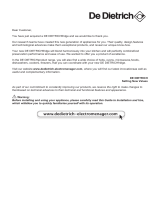
149809
Equipment depends on the model.
• Shelves can be optionally placed on the guides inside the
appliance. They are protected against pulling out. To remove
the shelf, slightly lift up the back part and pull it out. Quickly
perishable food should be stored on the back i.e. the coldest
part of the shelves.
• Special pull-out drawer (certain models only)
is installed onto the guide at the most convenient location in
the refrigerator, to allow extraction from the appliance on a
shelf and transfer to the table (used as a serving tray).
• Bottle carrier (certain models only) offers a choice of location.
It can carry different bottles and/or cans, and it may also be
used as a table bottle support. You can use it for storage of
various bottles or tins, and it can also be used as a table plate.
Certain models are equipped with wire bottle rack which
enables placing of bottles on the cork. It is safeguarded
against pulling out. It may be pulled out only if empty, by lifting
the front part and pulling it towards you. Place the bottle rack
in the appliance in such way to avoid obstruction of door
closing by the length of the stacked bottles.
Maximum load of the rack is 9 bottles of 0,75 l, or 13 kg of
total mass - see label at the right side of the interior of the
appliance.
• Crisp tray below the glass shelf at the bottom of the
refrigerator is used for storage of fruit and vegetables.
With some models, the compartment is mounted on telescopic
runners/rails with one or two separate compartments
(depending on the model); this enables separating various
types of food and adjusting the compartments to your own
requirements and habits.
• Interior of the door is fi tted with trays and shelves for storage
of cheese, butter, eggs, yoghurt and other small packages,
cans, jars, etc. Bottom part of the door is fi tted with the bottle
rack and further below is the tube holder for convenient
storage of tubes without overturning.
• Portable trays (certain models only) with lids are placed on
deep trays. They are used for storage of small size food, used
for breakfast and/or other snacks. You may also store food
separated by the sweet, salty, sour, etc. principle.
One of the lids carries the wooden cheese board.
• Two-row tray (certain models only) in the refrigerator door
inner liner for frequently used food offer you much better use
of space in the door inner liner.
Food should be sorted in two rows according to the principle
- high at the back and low in the front.
• Fan (located under the ceiling) provides better distribution of
temperature and reduces dew on storage surfaces.
Interior accessories and
space distribution
17






















